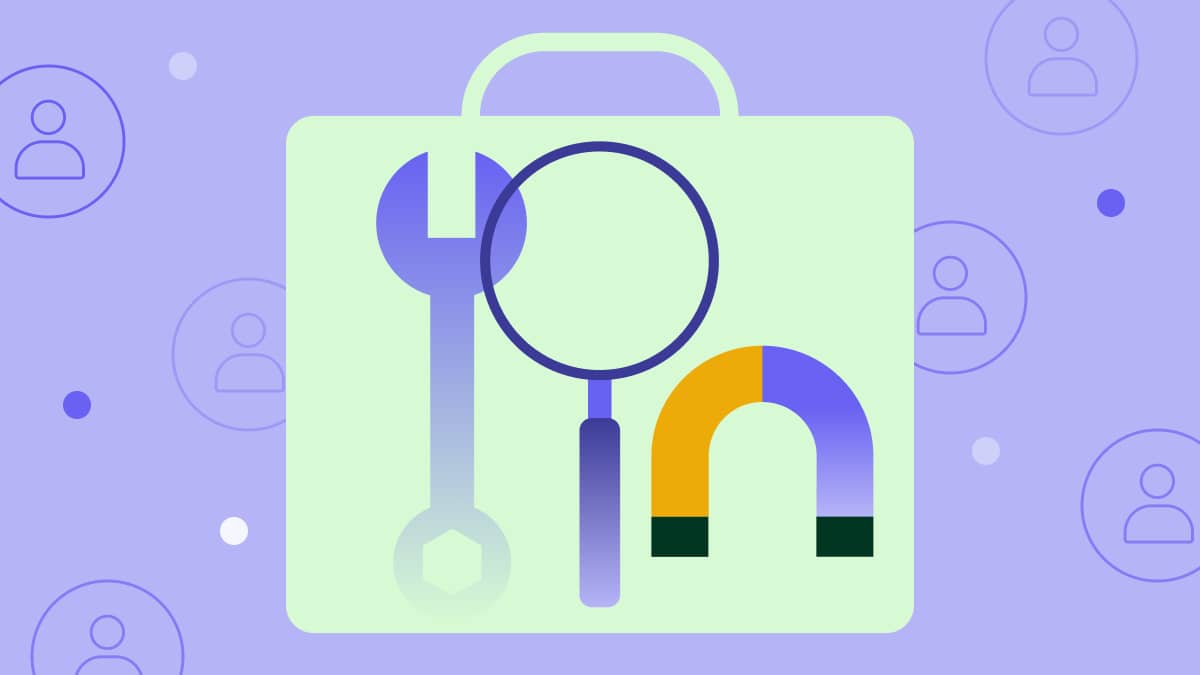AI prospecting tools help small sales teams identify potential customers and reach out to them more effectively.
If you want to scale your team’s prospecting efforts, this guide will help you choose the right AI-powered solution.
You’ll discover eight top tools, learn about their standout features and find out how to get the best results from your chosen solution.
What AI prospecting tools do (and how they work)
AI prospecting tools use artificial intelligence to streamline outbound sales activities and help reps work smarter.
Think of using AI for sales prospecting like having a dedicated sales assistant for your team.
The software helps reps scale their outreach efforts and find the right prospects to target.
Here are some key functions the tools perform in startups and small sales teams.
Automate manual tasks across the sales process
AI prospecting tools deliver AI sales automation to eliminate the time-consuming, repetitive tasks associated with outreach sales.
Using machine learning and data enrichment, AI-powered sales prospecting tools can:
Fill in prospects’ contact information
Generate the wording for cold emails
Automate drip email sequences and follow-up email reminders
Some solutions go further by pulling in accurate, high-value information about your prospects from external sources. This data includes job titles, company details and verified contact details.
Improve lead generation with AI-powered insights
Another common use case for AI prospecting tools is helping sales reps identify better leads who match their product’s ideal customer profile (ICP).
The software measures intent signals using sales intelligence and third-party datasets to identify prospects who are most likely to engage.
Some platforms use predictive analytics to rank potential leads or highlight the best converting segments. These insights boost sales by allowing small teams to spend more time on high-quality prospects and less time pursuing cold leads.
Support sales reps with AI assistants, agents and chatbots
AI prospecting tools can support sales reps during outreach by acting as real-time assistants. Features like AI agents and chatbots help reps generate talking points. AI assistants can also recommend follow-ups based on previous interactions.
During live sales calls, AI agents can surface real-time insights – like buyer intent signals – to help reps personalize their approach. This support can help improve customer conversion rates and move salespeople closer to closing deals.
8 top AI prospecting tools to try in 2025
Here are the eight best AI prospecting tools for sales teams and a summary of their standout features.
App | Standout features |
Pipedrive |
|
Apollo.io |
|
Seamless.AI |
|
Cognism |
|
Clay |
|
Lavender |
|
LinkedIn Sales Navigator |
|
ChatGPT |
|
Now that you have some insight into the best AI prospecting tools, let’s look at each in greater detail.
1. Pipedrive
Pipedrive’s AI CRM offers a CRM-first AI prospecting solution for small teams aiming to scale their sales workflows.
Prospector is a unique AI-powered database that’s part of Pipedrive’s LeadBooster add-on. It makes prospecting faster and more effective, using verified contact details for over 400 million profiles and 10 million companies.
You can narrow large lists down in seconds using filters like job title, location and industry.
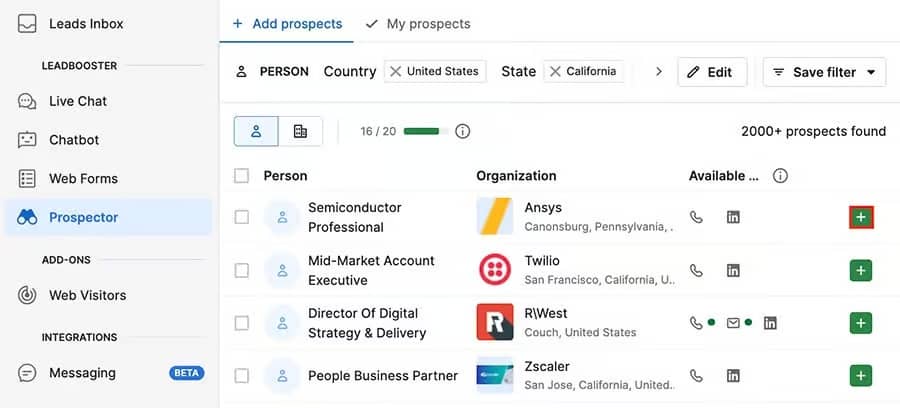
LeadBooster is available in the Premium and Ultimate Pipedrive plans.
Note: Pipedrive’s Pulse toolkit tracks real-time sales data to help you focus on the most promising prospects. The AI-powered Sales Assistant in Pipedrive provides actionable insights and automated reminders to highlight high-value prospecting.
Campaigns, Pipedrive’s AI-assisted email marketing software, enables users to create tailored email sequences directly within the CRM.
The AI email management tool uses lead data and previous interactions to suggest personalized email content. Automation handles follow-ups and tracks engagement, so reps know when to reach out next.
Once enabled, Pipedrive’s AI email writer is available in any email composer within the software. Simply open the composer and select “Write my email”
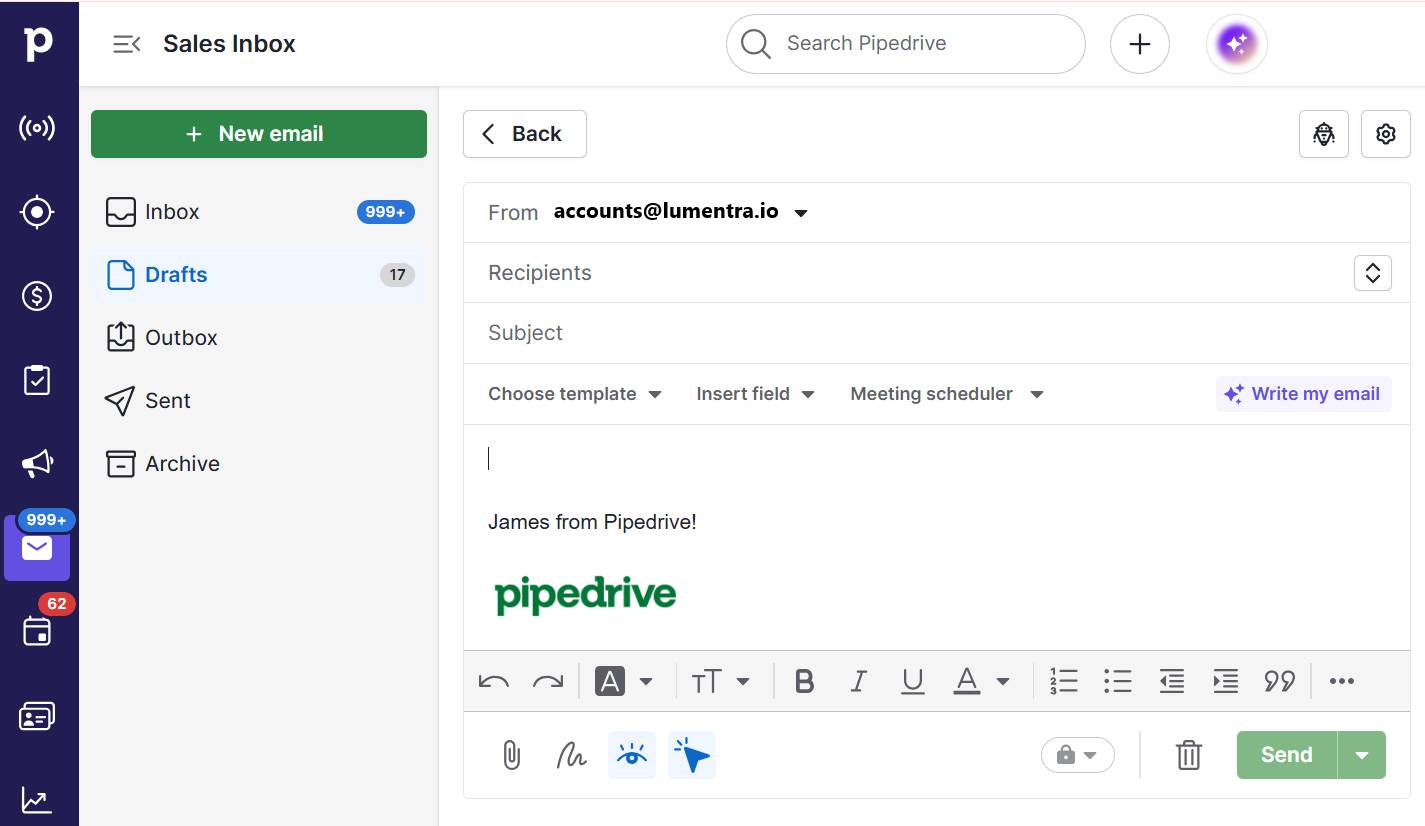
The software will display a prompt with fields for content, tone and length.
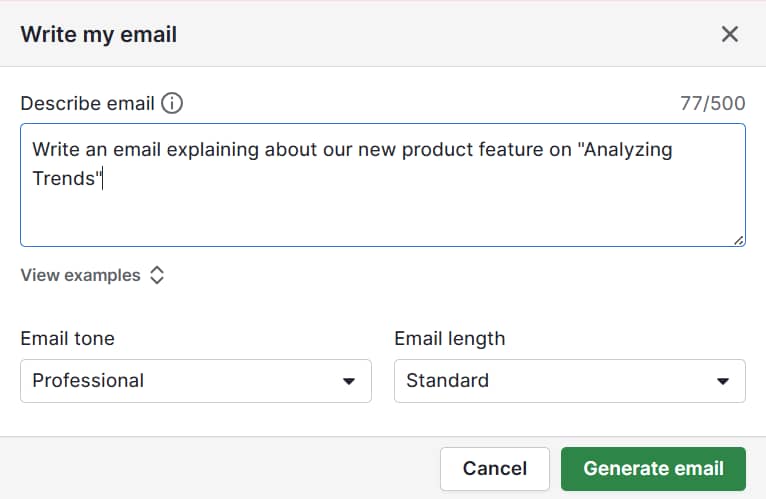
Select “Generate email”, and an AI-generated content suggestion will be ready to review after just a few moments.
Pipedrive is a powerful AI prospecting tool for small sales teams that value speed and simplicity. The all-in-one CRM combines AI-driven lead generation, data enrichment and email automation in a single, intuitive platform.
2. Apollo.io
Apollo.io combines AI-powered lead scoring with contact enrichment. This functionality allows sales teams to focus their efforts on prospects who are most likely to convert.
The platform continuously updates lead profiles with fresh data such as company size, role changes and intent signals.
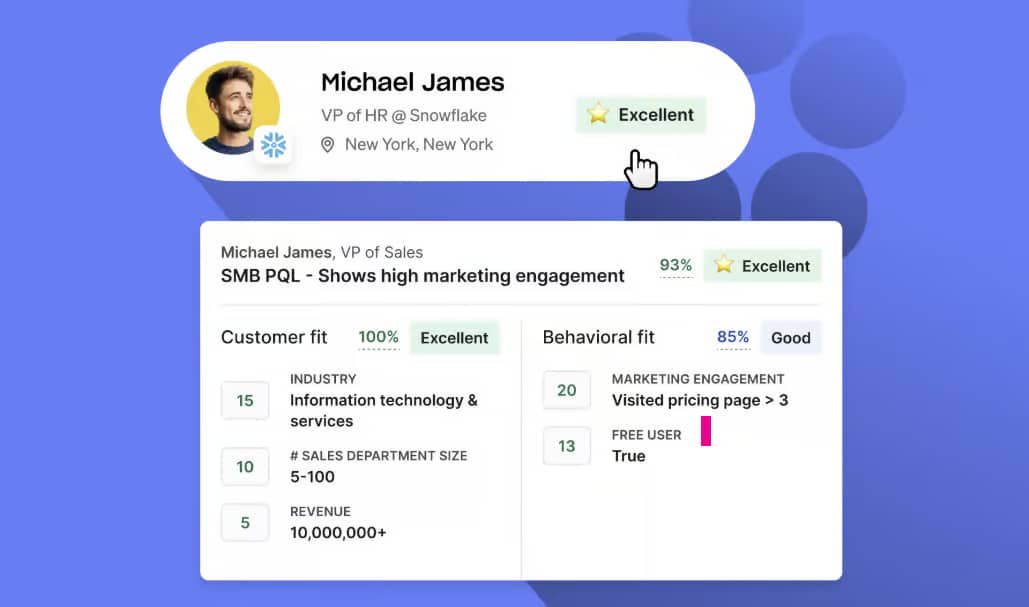
As a result, reps can be confident their outreach is timely and relevant.
Apollo integrates with Pipedrive for seamless data flow and unified sales pipeline management.
The integration can automatically push records from Apollo.io into Pipedrive based on a specific deal stage. For example, you can instruct the AI to add Apollo.io contacts to Pipedrive once reps categorize them as qualified leads.
3. Seamless.AI
Seamless.AI combines real-time contact data with intent signals to help sales teams identify potential buyers and prioritize high-quality leads.
The platform’s algorithms scan the web in real time to enrich and verify your lead lists. Seamless.AI integrates with Pipedrive to display this data in your CRM.
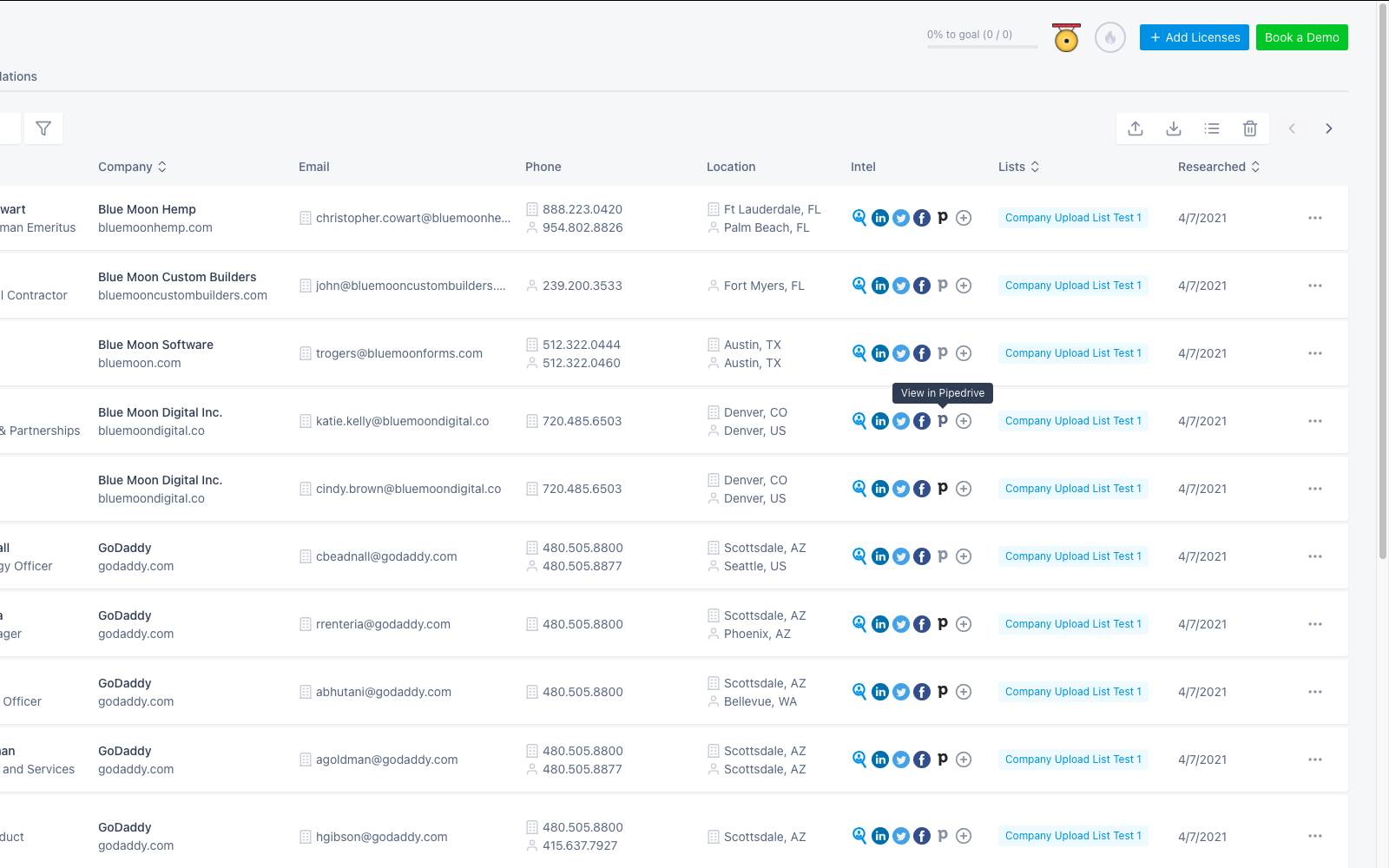
Seamless.AI uses intel from social media platforms and integrated CRMs to signal prospects’ buying intent. Sales leaders can choose from thousands of intent signals to create tailored insights for their teams.
Crush your manual admin with this sales automation guide
4. Cognism
Cognism is a lead generation platform that helps B2B sales teams find verified contact data, including phone numbers and emails.
Its AI-powered lead enrichment and real-time data verification tools reduce bounce rates and improve outreach performance.
Cognism’s intent score feature highlights prospects who show active buying signals. This insight helps sales teams prioritize leads more effectively.

Cognism provides accurate, up-to-date prospect profiles for better customer segmentation and personalized outreach.
5. Clay
Clay offers flexible data enrichment combined with automated sales tasks for sales development reps (SDRs). It merges multiple data sources to segment prospects by company size, role and customer behavior.
Clay sends bundled Slack messages summarizing customer signal activity, helping reps stay informed.
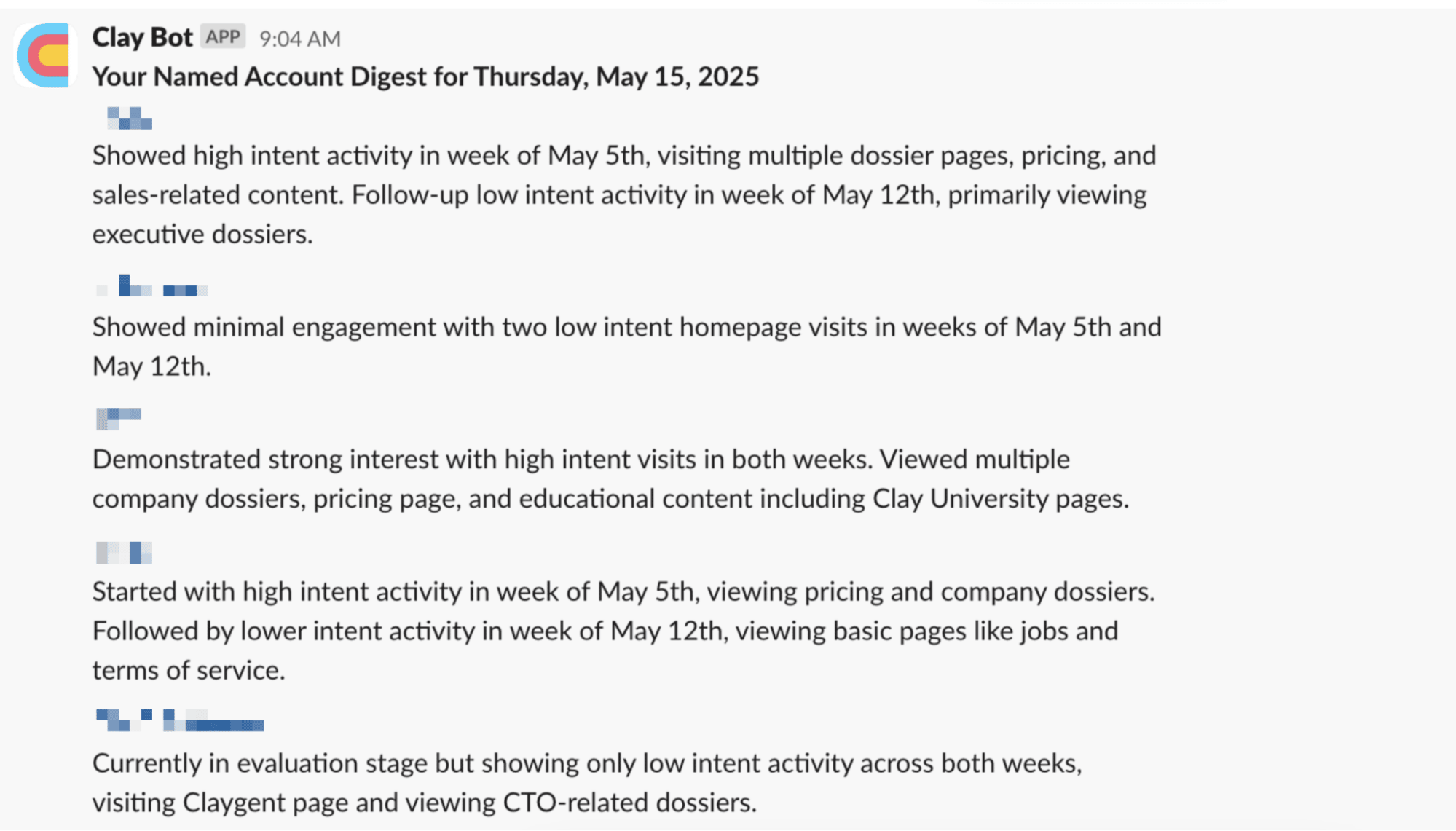
The platform’s automation features support tailored outreach based on lead actions or timelines, keeping communication timely and relevant.
Clay’s no-code setup and intuitive interface enable small teams to get started quickly.
6. Lavender
Lavender functions as an AI-powered email assistant for sales teams. The platform analyzes email drafts to provide real-time feedback on areas like tone and clarity.
Using past data, Lavender scores emails by forecasting the likelihood of a response. The tool also offers actionable suggestions on subject lines, phrasing and message length.
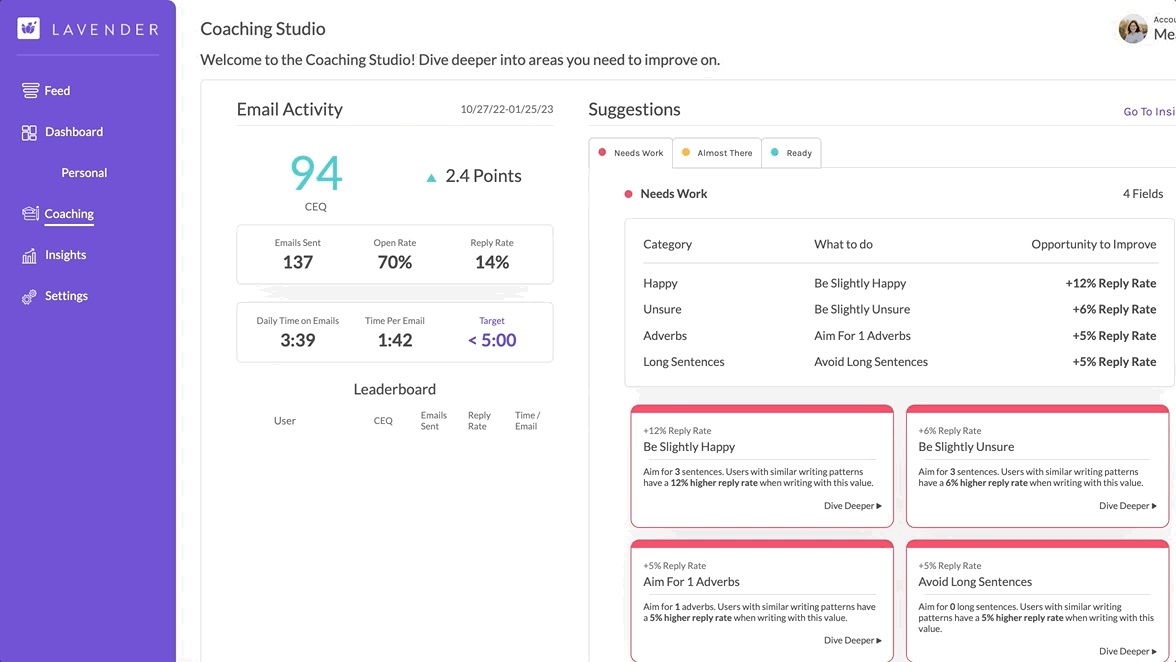
This feedback helps salespeople optimize their outreach messages before pressing send.
Lavender also integrates with Gmail and Outlook. This integration allows reps to draft and refine emails directly within their existing workflows.
7. LinkedIn Sales Navigator
LinkedIn Sales Navigator is an AI-powered sales engagement tool. It supports social selling by helping reps find and engage with the right decision-makers.
The tool uses AI and intent data to surface high-fit leads. It offers advanced search filters and real-time alerts on prospect activity.
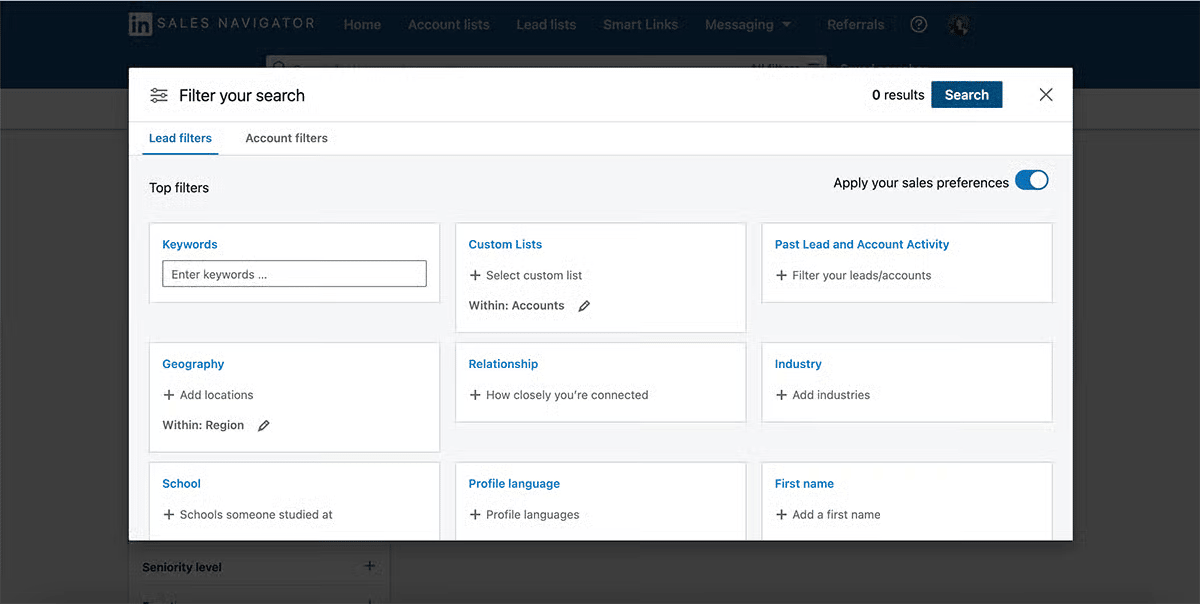
Sales teams can use LinkedIn Sales Navigator to:
Build and manage lead lists
Track prospects’ job changes
Engage directly with leads via InMail, LinkedIn’s instant messaging platform
Integrating LinkedIn Sales Navigator with your CRM allows you to save accounts as new contacts with a single click. You can use Zapier to connect the tool to Pipedrive.
8. ChatGPT
Sales professionals can use ChatGPT for sales. The tool can generate cold emails, LinkedIn messages and SDR scripts in seconds.
The generative AI behind ChatGPT helps reps personalize their outreach and prepare for conversations with prospects.
Here are some examples of ChatGPT prompts to use for sales outreach:
1. “Write a compelling cold email template for introducing our [product/service].”
2. “Generate a LinkedIn message for [insert profile] to engage this potential customer.”
3. “Create a script for a cold call to a prospect in [specific sector].”
4. “Suggest subject lines for an email campaign targeting [target audience].”
5. “Draft a follow-up email for prospects who have shown interest in our [product/service].”
6. “Provide tips for crafting a personalized Instagram message to connect with this potential client: [add link].”
ChatGPT is a flexible, accessible tool for sales teams looking to improve the quality and efficiency of their outreach.
How to choose the right AI prospecting tool for your sales team
If you’re unsure which AI prospecting tool would best fit your sales function, consider the following factors and key features as you weigh your options:
What to evaluate | Why it matters |
Time-saving functionality | Use sales data to identify time-draining tasks in your sales process, like lead qualification or email writing. Choose AI sales tools that automate those steps while surfacing actionable insights. |
CRM compatibility | Look for tools that sync with your CRM. This integration will reduce manual data entry, keeping your pipeline clean and sales reporting accurate. |
Ease of use for small teams | Prioritize platforms with intuitive UX and minimal setup. Look for ready-to-use features like templates and automation triggers. |
Potential ROI | Evaluate pricing based on team size and outreach volume. Choose tools that save time and scale with your sales efforts. |
Now that you know how to identify the right AI prospecting tool, let’s explore how to use the software to its fullest potential in your sales process.
Spend More Minutes Selling With These Time Saving Sales Hacks
4 best practices for using AI in sales prospecting
Here are four best practices for getting maximum value from your AI prospecting tool.
1. Remember that personalization needs the human touch
AI can quickly draft cold emails or message templates, but email personalization is often what gets replies.
After generating a message with AI, add one to two specific details that show you’ve done your homework, like referencing a recent funding round, product launch or industry shift.
For example:
Instead of sending:
“Hi Sarah, I help companies like yours optimize their tech stack.”
Try:
“Hi Sarah, I saw your team just rolled out a new analytics platform – congrats! I help scaling fintech teams streamline their tools without losing visibility.”
A relevant, timely message feels human, builds trust and is more likely to start a real conversation.
2. Maintain accurate lead data with AI enrichment features
Most AI prospecting tools use real-time data enrichment to keep contact details, job titles and company info current. Ensure your tool is integrated with your CRM correctly, with the enrichment features switched on. That way, you can be sure your team always works with the freshest data.
These steps reduce the risk of emails bouncing and promote positive customer interactions during prospecting activities.
For example, a contact’s job title might change from “Head of Marketing” to “CMO”. In this scenario, a sales rep could open a conversation by congratulating the contact on their new role.
3. Align AI tools with your outreach cadence
AI prospecting tools work best when they follow the rhythm of your sales cycle. Start by mapping out your typical outreach sequence, including when your team:
Sends emails
Makes calls
Sends messages on LinkedIn
Then configure your AI tool to match that cadence.
For example, you might use automation to send timely follow-ups and support manual outreach when required.
Schedule an AI-generated “just checking in” email three days after no reply. If there’s still no response by day five, set a reminder for a rep to follow up with a LinkedIn voice note or phone call.
4. Track the tool’s performance and iterate
AI prospecting tools give you access to sales performance data that can help reps move customers through the sales funnel.
Monitor sales metrics like open and reply rates, conversion rates and pipeline value. Use this data to refine your targeting, test different messaging and double down on what’s working.
For example, you might compare how value-driven messages perform against pain-point-driven communication as follows:
“Cut project delivery times in half with our all-in-one platform.”
Vs.
“Tired of missing deadlines and juggling multiple tools?”
If the first type of message gets more replies from your target customer persona, place more emphasis on your product’s value proposition in your future outreach.
While following best practices is important, knowing how to avoid common mistakes is equally critical.
Common pitfalls to avoid when adopting AI prospecting tools
The same mistakes frequently prevent sales teams from making the most of AI prospecting software. Here are the most common missteps and how to avoid them:
Pitfall | How to avoid it |
Choosing tools with no CRM integration | Verify the tool supports seamless CRM integration to ensure customer data syncs automatically, preventing manual updates and keeping your pipeline accurate. |
Failing to consider setup time | Prioritize solutions with fast onboarding, clear documentation and ready-to-use templates to minimise delays in getting started. |
Investing in unnecessary features | Select platforms that allow you to tailor your subscription so you pay only for features aligned with your sales goals. |
Overlooking GDPR and data compliance | Confirm your preferred AI prospecting tool is GDPR compliant and follows all relevant data privacy regulations when handling customer data. |
Relying too heavily on automation | Use AI to draft and scale outreach, but always review and personalize your messages to maintain relevance and trust. |
Avoiding these common pitfalls helps your team remain efficient and compliant as they use AI prospecting tools.
Download Your Guide to Preventing 5 Common Sales Mistakes
Final thoughts
AI prospecting tools can give small sales teams a powerful edge when identifying and reaching out to potential customers.
Choosing the right solution for your sales team can make prospecting a key driver of revenue growth in a startup or a scaling small business.
Pipedrive’s sales CRM helps teams plan, automate and track their prospecting efforts, with seamless AI-assisted lead enrichment. Start your free trial of Pipedrive today.
